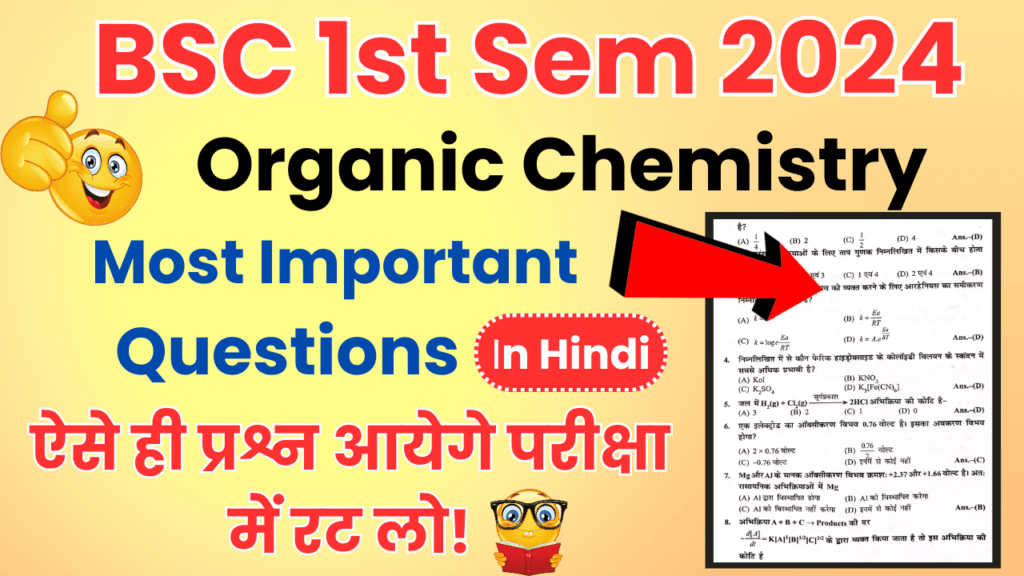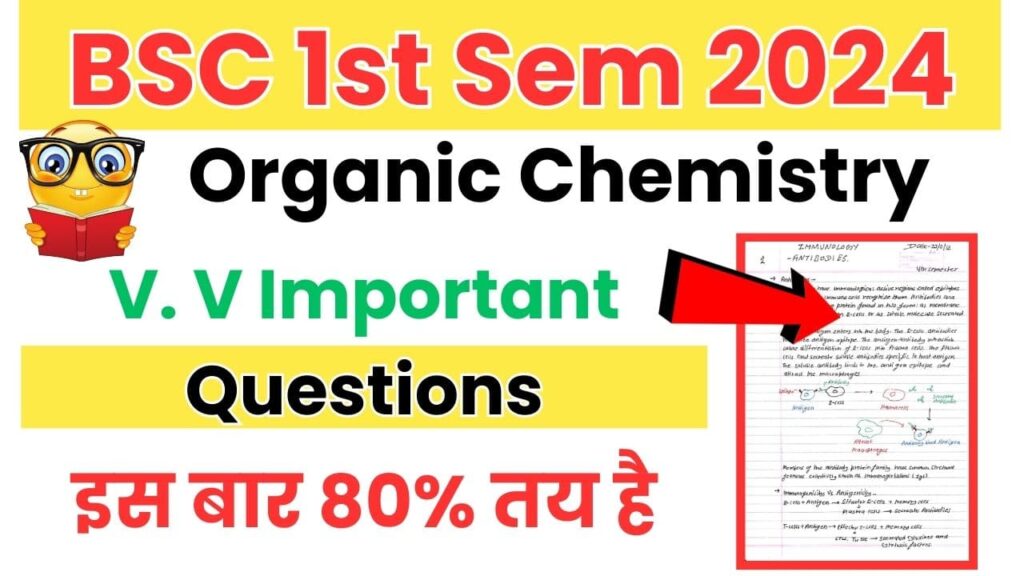नमस्कार साथियों क्या आप जानना चाहते है BSC 1st Semester Organic Chemistry Important Questions in Hindi 2025 के बारे में? दोस्तों आपका स्वागत है इस लेख में, हम आपको BSC 1st Semester Organic Chemistry Important Questions in Hindi के साथ BSC 1st Semester Physical Chemistry Important Questions in Hindi, BSC 1st Semester Organic Chemistry Important Questions 2025 के बारे में सब कुछ बताएंगे।

जैसा कि आप जानते हैं Chemistry एक बहुत ही दिमाग लगाने वाला subject है, तो इस लेख में हमने BSC 1st Semester Organic Chemistry Important Questions इकट्ठा किया है जो कि आपको पढ़ने में मदत करेंगे अगर आप इस लेख में बताए हुए Important Questions को एक बार रट लेंगे तो आप समझ लो 60% syllabus cover हो जाएगा, तो BSC 1st Semester Organic Chemistry Important Questions In Hindi की पूरी सूची पढ़ने के लिए इस लेख को अंत तक जरूर पढ़ें ।
यह BSC 1st Semester Organic Chemistry Important Questions के महत्वपूर्ण प्रश्न 2025 प्रतिष्ठित संस्थानों के अनुभवी शिक्षकों द्वारा तैयार किए गए हैं, इन प्रश्नों के पेपर में आने की अधिक संभावना है, इसलिए इन्हें अच्छी तरह से तैयार करें।
BSC 1st Semester Organic Chemistry Important Questions In Hindi

Q1: संरचनात्मक रासायनिक विज्ञान के क्षेत्र में समानांतर और गतिशील विवाह का वर्णन कीजिए। (Describe parallel and dynamic marriage in the field of structural organic chemistry.)
Q2: रासायनिक योजना के तीन मुख्य पूर्वानुमान क्या हैं? (What are the three main types of chemical structures?)
Q3: अल्केनों के नाम और उनकी गुणधर्मों का वर्णन कीजिए। (Describe the names and properties of alkenes.)
Q4: एक रासायनिक अभिक्रिया के लिए किन दो वस्तुओं की आवश्यकता होती है? (What are the two things required for a chemical reaction?)
Q5: ऑल्डोहॉल्स के नाम और उनकी गुणधर्मों का वर्णन कीजिए। (Describe the names and properties of alcohols.)
Q6: क्या होता है एमाइन? (What is an amine?)
Q7: रासायनिक तत्व के रूप में कार्बन की विशेषताएँ क्या हैं? (What are the characteristics of carbon as a chemical element?)
Q8: अल्केनों और अल्काइंस के बीच अंतर क्या है? (What is the difference between alkenes and alkynes?)
Q9: सुरक्षित और असुरक्षित रेजेंट के उदाहरण दीजिए। (Give examples of safe and unsafe reagents.)
Q10: निम्नलिखित क्षेत्रों में रासायनिक रियक्शन के उदाहरण दीजिए: उपनिकाय, कार्बोहाइड्रेट, नाइट्रोजन और ऑर्गनोहलोजन। (Give examples of chemical reactions in the following areas: alkene, carbohydrate, nitrogen, and organohalogen.)

Q11: कार्बनिक रासायनिक यौगिकों में संरचनात्मक योजनाओं की प्रमुखता क्या है? (What is the significance of structural arrangements in organic compounds?)
Q12: कार्बनिक यौगिकों के लिए प्रमुख उत्पादों की परिभाषा दीजिए। (Define the major products for organic compounds.)
Q13: इनर्टिया का अर्थ क्या है और क्या उसका रासायनिक महत्व है? (What is the meaning of inertia and what is its chemical significance?)
Q14: आधुनिक रासायनिक विज्ञान की प्रमुख धाराएँ क्या हैं? (What are the main features of modern organic chemistry?)
Q15: रासायनिक यौगिकों की उत्पत्ति और उनके प्रकार के बारे में विस्तार से बताएं। (Explain in detail the origin and types of organic compounds.)
Q16: रासायनिक अध्ययन के लिए आवश्यकताएँ क्या हैं? (What are the requirements for chemical studies?)
Q17: रासायनिक संयोजन के क्या-क्या लाभ हैं? (What are the benefits of chemical synthesis?)
Q18: एल्कोहल और अथर एल्कोहल के बीच अंतर क्या है? (What is the difference between alcohol and ether?)
Q19: ऑल्डेहाइड और केटोन के बीच अंतर क्या है? (What is the difference between aldehyde and ketone?)
Q20: अल्काइंस और एल्केन के बीच अंतर क्या है? (What is the difference between alkynes and alkenes?)
Q21: रासायनिक अभिक्रियाओं के तीन मुख्य प्रकार क्या हैं? (What are the three main types of chemical reactions?)
Q22: संयोजन और विघटन के बीच अंतर क्या है? (What is the difference between synthesis and decomposition?)
Q23: रासायनिक संयोजन क्या है? (What is chemical synthesis?)
Q24: रासायनिक संयोजन के क्या-क्या प्रकार होते हैं? (What are the types of chemical synthesis?)
Q25: संरचनात्मक रासायनिक विज्ञान में प्रमुख समस्याएँ क्या हैं? (What are the main problems in structural organic chemistry?)
Q26: रासायनिक योजनाओं के क्या-क्या प्रकार हैं? (What are the types of chemical structures?)
Q27: रासायनिक अभिक्रिया के लिए क्या-क्या आवश्यकताएँ होती हैं? (What are the requirements for a chemical reaction?)
Q28: रासायनिक यौगिकों की संरचना क्या है? (What is the structure of organic compounds?)
Q29: रासायनिक यौगिकों के उत्पादन में कौन-कौन से कारक भूमिका निभाते हैं? (Which factors play a role in the production of organic compounds?)
Q30: रासायनिक संयोजन की विशेषता क्या है? (What is the specialty of chemical synthesis?)
हमें उम्मीद है कि इस लेख की मदद से आपको BSC 1st Semester Organic Chemistry Important Questions In Hindi 2024 के बारे में जानकारी मिल गई होगी।
दोस्तों आपको यह पोस्ट कैसी लगी कृपया हमें कमेंट सेक्शन में बताएं और यदि आपके कोई प्रश्न हों तो बेझिझक हमसे Comment Box में पूछ सकते हैं। यदि आपको यह पोस्ट उपयोगी लगी तो कृपया इसे दूसरों के साथ साझा करें।